The Checker Maven
The World's Most Widely Read Checkers and Draughts Publication
Bob Newell, Editor-in-Chief
Published every Saturday morning in Honolulu, Hawai`i
Noticing missing images? An explanation is here.
A Great Checker Resource: Google Books

In recent years, checker books have been hard to come by and often expensive. Publication of new checker books has slowed to a trickle; and while most if not all of the new books are very fine indeed, they are often sold in limited quantities through private sources. It all makes it difficult for the new checkerist looking for study material, the collector looking to broaden his collection, or the experienced player looking to expand his horizons even further.
The Checker Maven has reproduced a number of checker works, both old and new, in newly typeset editions; these have met with a generally enthusiastic reception. But as a small publisher there's a limit to how much we can produce, and it's never as much as we or the checker-playing public would wish.
Enter Google Books (books.google.com), which has as its goal the colossal task of digitizing the world's books, both new and old. An incredible and growing selection is available on-line, and checker books have not been neglected.
Go to the site and search for "checkers" or "draughts" and you'll see what we mean. Dozens of books are listed. While a good part of the collection just shows the book cover or a brief extract, there are numerous books listed as free Google ebooks, and these are yours for the taking. The free books tend to be older classics, but what better way to build or expand a collection of quality checker literature?
There are a few limitations. The books are PDF images and are not electronically searchable; some of the scans are imperfect, and of course they look like what they are: images of the pages of old books. But trust us, you'll want to download many of these. They can easily be printed and used in hard-copy, or simplest of all, just read on the computer.
In today's column we'd like to feature a game from one of the real finds on the site, the match book from the 1887-8 contest between Charles Barker of America and James Smith of Scotland. If you don't have this book in your collection, by all means get it for free from Google Books.
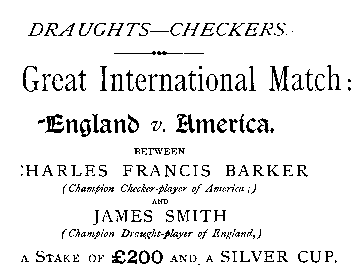
The match was won in a convincing fashion by the American champion Barker. Here is the run-up to the critical position in game four, in which Barker drew first blood.
| 1. | 12-16 | 24-20 |
| 2. | 8-12 | 28-24 |
| 3. | 3-8 | 21-17 |
| 4. | 16-19 | 24x15 |
| 5. | 10x19 | 23x16 |
| 6. | 12x19 | 17-14 |
| 7. | 9x18 | 22x15 |
| 8. | 11x18 | 26-22 |
| 9. | 7-11 | 22x15 |
| 10. | 11x18 | 20-16 |
| 11. | 8-12 | 16-11 |
| 12. | 19-24 | 27x20 |
| 13. | 6-10 | 30-26---A |
Forms diagram.
A---Definitely loses.
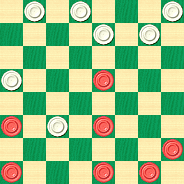
BLACK
Black to Play and Win
B:W32,31,29,26,25,20,11:B18,12,10,5,4,2,1.
Can you correct the losing move? Can you find the winning line of play and book the win? Or will the page turn on you? Find the answers and then click on Read More to scan the solution.![]()
Alex Retains His Title
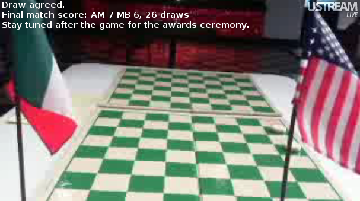
Alex Moiseyev retained his 3-move World Championship title with a narrow win over Italian challenger Michele Borghetti in a match characterized by sportsmanship, great play, and much excitement. The final score was 7-6 with 27 draws.
Links to full details can be found on the American Checker Federation website (linked in the left-hand column). We are all grateful to John Acker for streaming the entire match live over the internet, providing hours of checker entertainment to many fans around the world.![]()
Deans, Pearson, and Quinlan: Laying Down the Law in Checkers

Deans, Pearson, and Quinlan: It sounds more like the trio of lawyers shown above than a trio of checkerists credited with thematically related studies, but checkerists they were. We really don't know whether one or more of them might have been lawyers during their time in the mid-to-late 1800s; we suppose it's possible, but we didn't come up with any further information.
We can confidently say, however, that the three positions diagrammed below are eminently practical and, as the latest entries in our Checker School series, well worth your time to master. All positions are shown with White at the top for ease in comparison.
E. DEANS
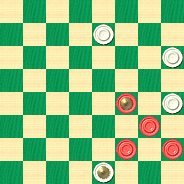
BLACK
White to Play and Draw
W:W26,21,13,K2:BK14,9,6,5.
WHITE
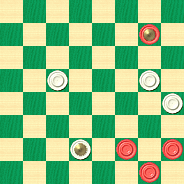
BLACK
Black to Play and Win
B:W19,17,13,K7:BK25,6,5,1.
WHITE

BLACK
Black to Play and Win
B:W15,13,K7:BK14,9,6,1.
These studies "lay down the law," so to speak, for endings of this type. Do your best to find the right moves--- legal moves, of course--- to make your case, then click on Read More for the definitive judgments, including sample games, detailed notes, and a supplementary problem.![]()
World Championship Streaming Live

Thanks to the fantastic work of John Acker, the current 3-move World Championship match between defending champion Alex Moiseyev of the United States, and challenger Michele Borghetti of Italy, is being streamed live from Cleveland, Ohio. Click on the ACF link on the left side of the page for further information. This is an event that is absolutely not to be missed!![]()
Frank Dunne's Shot

In our ongoing series taken from Willie Ryan's Tricks Traps & Shots of the Checkerboard, we've from time to time found new wrinkles via computer analysis, as we have with today's offering. Willie of course got it right (which happens at least 99% of the time), but there is an interesting line of play that the computer turned up and that Willie apparently didn't examine. Let's have a look as Willie describes the problem.
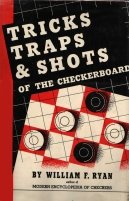
"The name of Frank Dunne, famed English master of five decades ago---1, holds an illustrious place in the archives of checker literature. His writings on the game were of the highest order, and he made many outstanding contributions to the silent art. Here we record the ever useful Dunne Shot which arises in play from several different openings.
| 10-15 | 24-19 | 6-9---A |
| 22-18 | 15-24 | 22-18 |
| 15-22 | 28-19 | 4-8 |
| 25-18 | 8-11 | 26-22 |
| 9-13 | 29-25 | 1-6---B. |
| 18-14 | 11-16 | See the |
| 11-15 | 25-22 | diagram. |
A---If black plays 4-8 here, then white wins quickly with this pretty touch: 14-10!, 7-14, 22-17, 13-22, 26-10, 6-24.
B---Inviting, but fatal. The correct sequence to draw is: 16-20, 30-25, 8-11, 18-15, 11-18, 22-15, 9-18, 23-14, 1-6, 31-26, 3-8, 26-23,13-17, 32-28, 20-24, 27-20, 7-10, 14-7, 2-27, 21-14, 27-31, 19-15. Wm. F. Ryan."
1---At present writing, more like 11 decades---Ed.
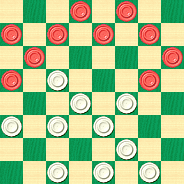
WHITE
White to Play and Win
W:W32,31,30,27,23,22,21,19,18,14:B16,13,12,9,8,7,6,5,3,2.
Bombard this position with your best ideas and see if you can find the White win. As we pointed out above, there are some subtleties here that we discovered with computer analysis, so you may find this an explosive problem, but take a shot and then click on Read More to see the solution.![]()
Summer Speedster

Does it seem like summer speeds in and just as quickly speeds out? It's already August, arguably the hottest month in most of the Northern Hemisphere, but September lies just around the corner, bringing with it the fall season.
But we'd like you to stay in gear for a few moments and contemplate this month's speed problem. It's from actual play in a game won by on-line checkerist Chris T. from Wales in the United Kingdom. The problem is not terribly hard but requires keen "checker vision," something Chris T. seems to have in spades.
We'll be generous and give you 15 seconds to solve it. When you're ready, click on the link below to display the problem and start the clock. After you've speedily found the solution, click on Read More to check your work.
August Speed Problem (moderate difficulty - 15 seconds)
![]()
Zig-Zag
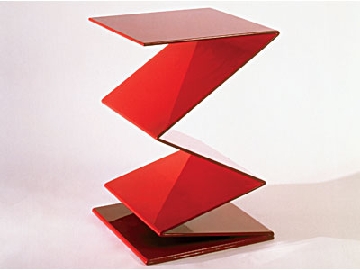
The term zig-zag is of uncertain origin. It seems to have first appeared in print in a Dutch publication in 1706; it appeared in English around 1728. It is probably a variation of the German word "zickzack." This word evidently referred to castle fortifications, which were often built in a zig-zag form; the word "zick-zack" was also used in English, along with "zic-zac," until "zig-zag" seemed to become the standard--- if such things really have standards.
Today's checker problem definitely has a zig-zag nature, as can be seen in the diagram below.
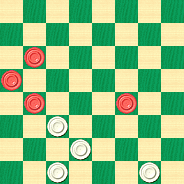
WHITE
White to Play and Win
W:W22,26,30,32:B9,13,17,19.
This is supposed to be an easy problem, but in fact it requires some thought. Can you make those pieces zig and zag to a White win? Give it a try and then zig-zag your mouse over to Read More to see the solution.![]()
Down On The Farm (Team)
Marvin J. Mavin found himself at Fifty-Third Stadium in Comstock Park, Michigan, playing fifth board for the West Michigan Wompers in a matchup with the Great Lakes Glommers, in the single A Midwest League.

Checker Fans at Fifty-Third Stadium, Comstock Park, Michigan
Yes, that's fifth board and Single A. Just how such a turn of events came about is a bit of a story.

Marvin J. Mavin
It all started when Marvin, the usual Captain and first board player for the Detroit Doublejumpers, an outstanding Major League team, was called into the team manager's office. The manager, tired of Marvin embarrassing the team with his beer-drinking antics, was in the mood of teaching Marvin a lesson. But Marvin had been foolish enough to have had a couple of beers at lunch and started calling his boss a few uncomplimentary names as the boss was attempting to lay down the law.
That's when the manager drew the line. No one, even a star player, had the right to be insubordinate and rude, much less engage in behavior that provided a bad example to the team's younger fans. The manager decided that Marvin should be sent down, not even to the AAA or AA level of Detroit's farm team system, but all the way to the Single A level, giving him time to contemplate the error of his ways. To further ensure that Marvin got the message, he was to play fifth board--- the lowest slot on the team.
Marvin, to say the least, was not very happy. That, his manager told him, was exactly the point. Furthermore, Marvin would remain with the farm team until he improved both his attitude and behavior, or lacking that, was fired altogether.
"You have no more than a month to shape up," the manager said, "or your career in professional checkers is over."
And so Marvin was sitting across the board from Chester Schlockovitz, fifth board player for the Glommers. Chester was a nice enough old guy. He had never risen higher than Single A checkers but somehow had hung on for 35 years or so in the lower rungs of the professional ranks. He wasn't a has-been so much as a never-been, but you had to admire his persistence.

Chester Schlockovitz
Marvin, to his chagrin, was being made to pass a breathalyzer test before each game to ensure that he had been staying away from the beer. The coach of the Wompers, Thaddeus Twizzler, was strict with the players and Marvin's superstar status didn't earn him any slack in Thaddeus's eyes. Marvin would follow the rules just like anyone else and that meant no drinking during the playing season, period. Thaddeus was adamant. "Drinking ain't never done no one no good, and they sure don't play checkers right if'n they do drink," he would often say.

Thaddeus Twizzler
So here Marvin was, facing Chester over the board. "Nice afternoon, city boy," Chester said, "reckon you can beat me at this here game?" It was clear that Chester, in his plain-speaking manner, meant this as a friendly sort of challenge.
Marvin didn't reply; the starting whistle had blown, and Chester, playing Black, fell silent and made his first move. The game played out as shown below.
| BLACK | WHITE | |
| Chester | Marvin | |
| 1. | 9-13 | 22-18 |
| 2. | 12-16 | 24-20 |
| 3. | 8-12 | 28-24 |
| 4. | 4-8 | 18-14 |
| 5. | 10x17 | 21x14 |
| 6. | 16-19 | 24x15 |
| 7. | 11x18 | 26-22 |
| 8. | 7-11 | 22x15 |
| 9. | 11x18 | 14-10 |
| 10. | 6x15 | 23x14 |
| 11. | 3-7 | 25-22 |
| 12. | 1-6 | 22-17 |
| 13. | 13x22 | 31-26 |
| 14. | 22x31 | 32-28 |
| 15. | 31x24 | 28x3 |
"Well, how d'ya like them apples!" Chester chuckled cheerfully. "You ain't a bad player for one a them there city fellas!"
| 16. | 6-9 | 14-10 |
| 17. | 9-14 | 29-25 |
| 18. | 5-9 | 20-16 |
| 19. | 12x19 | 3x12 |
| 20. | 19-23 | 12-16 |
| 21. | 23-27 | 16-19 |
| 22. | 27-31? |
Marvin, in a brief moment of feeling, looked over at Chester with a sad expression. Chester had played a fine game up to this point, but it was moves such as this that separated the Major Leaguers from the also-rans. Marvin now had a clear win, and he knew it.

WHITE (Marvin)
White to Play and Win.
W:W30,25,K19,10:BK31,14,9,2.
Can you match wits with Marvin and find the win, or will you be sent down to the farm team too? Give it your best--- your professional checker career may depend on it--- and then click on Read More to see the solution and the rest of the story. While you're at it, correct Chester's losing move, too.![]()
Grand Reopening

Our offices are open again and we're returning to business as usual. We're glad to be back!![]()
The Laboring Gardener

The gardener in the photo above is doing things the old-fashioned, laborious, long and hard way. Sometimes that's the only way to get the job done; in life and in checkers alike there isn't always a short-cut and there isn't always an "easy" way.
Today's lesson in our Checker School series is attributed to a Mr. W. Gardner (not "Gardener" although it's close enough for us). There are actually two solutions to the problem; there's the originally published solution, and an alternative. The alternative is long and tough, but the main solution is only a little less so. In short, this one has to be done the hard way, with much patience, effort, skill and perseverance. Here's the situation.
WHITE
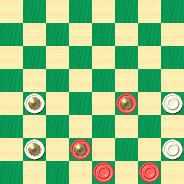
BLACK
Black to Play and Win
B:WK16,13,K8,5:BK14,K7,2,1.
If you think this isn't an easy position to win, you're right, but it can be done. Stick with it, work at it, hoe away until the ground is cleared; then rake your mouse over Read More to see the original solution, a new solution, two sample games, detailed notes and a special sidebar about a checker-playing robot.![]()
The Checker Maven is produced at editorial offices in Honolulu, Hawai`i, as a completely non-commercial public service from which no profit is obtained or sought. Original material is Copyright © 2004-2025 Avi Gobbler Publishing. Other material is public domain, as attributed, or licensed under Creative Commons. Information presented on this site is offered as-is, at no cost, and bears no express or implied warranty as to accuracy or usability. You agree that you use such information entirely at your own risk. No liabilities of any kind under any legal theory whatsoever are accepted. The Checker Maven is dedicated to the memory of Mr. Bob Newell, Sr.

